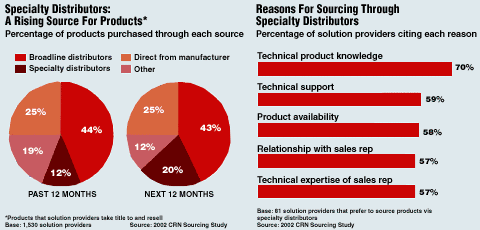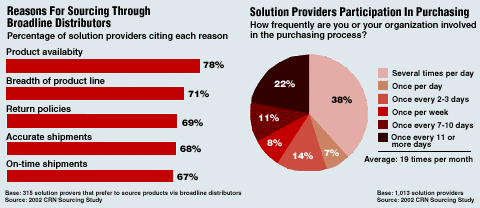Speciality Distributors Becoming Channel Contenders
Though the channel isn't exactly Hollywood, his message evoked more than just entertainment. Greenville, S.C.-based ScanSource, a distributor of automatic-data-capture and point-of-sale technology, posted a 38 percent year-over-year revenue gain in its fiscal 2003 first quarter ended Sept. 30, and it forecasts a double-digit sales increase for the second quarter.


Similar levels of growth may be upcoming from other specialty distributors, which are gaining solution provider mind share in a fiercely competitive distribution arena, according to the 2002 CRN Sourcing Study. Over the next year, the more than 1,500 solution providers surveyed by CRN said they expect to source 20 percent of the products to which they take title and resell from specialty distributors, up from 12 percent during the past year.
Much of that added business from specialty distributors,those that focus on specific technologies, vertical markets or business segments,stands to come at the expense of manufacturers' direct sales, according to the study. Solution providers said they expect 12 percent of the products to which they take title and resell in the next year to come directly from vendors, down from 19 percent during the previous year.
The share of products sourced from broadline distributors looks to stay about the same, the study found. Over the next year, solution providers expect 43 percent of the products to which they take title and resell to come from broadline distributors, compared with 44 percent in the prior year.
The move to solution-based selling from a product-based strategy is combining with a technology sales drought and a saturated product market to reshape the way solution providers procure products, according to CRN research. At a time when corporate technology budgets are drum-tight and IT staff are skeptical about new purchases, solution providers are turning to suppliers that offer the deep technical product and service knowledge they need to craft complete solutions that meet the requirements of their customers.
And for a rising number of solution providers, specialty distributors are the ticket. Of the solution providers that prefer to source through specialty distributors, 70 percent said they do so because of the supplier's technical product knowledge, and 59 percent cited their technical support, the CRN study said.

\
Led by President and CEO Mike Baur, POS distributor ScanSource posted a 38 percent sales gain in its fiscal first quarter.
Mike Cleary, owner of Cordian Technologies, a Minneapolis-based solution provider, said that although he can get products from many sources, he sticks with ScanSource because of its commitment to its channel partners.
"We are working to move into the data-collection and radio-frequency markets," Cleary said. "Their professional services support is helping us, and that is invaluable to companies like ours that just don't have a lot of resources."
Jim Kargman, president of National Systems Corp. (NSC), a Chicago-based POS solution provider specializing in the food services market, couldn't agree more. In the past, NSC typically shopped for the best price first, but now the company banks on strong personal relationships with distributors as well as their expertise, he said.
"Buying from a specialty distributor is a huge advantage, particularly as products become more sophisticated," Kargman said.
Relationships, in fact, are another key reason that solution providers source through specialty distributors. In the CRN study, 57 percent of solution providers that prefer to source through specialty distributors cited the overall business relationship with their sales representative as a reason for doing so. Fifty-seven percent of those respondents also pointed to their sales rep's technical expertise.
For instance, a sales rep at a direct marketer or a broadline distributor might know a given product's catalog number, "but [he or she doesn't know anything about the product," Kargman said. "If I buy a bar-code reader that's supposed to work at a distance but doesn't because I was sold the wrong product, then I lose at least a day's worth of business dealing with it."
Joe Walz, president of Unique Software, an Eagan, Minn.-based solution provider that serves the education market, said that for many years, his company has worked with The Douglas Stewart Co., a specialty distributor based in Madison, Wis. The key reasons for that longevity? Strong partner service and convenience, Walz said.
"It comes down to the little things, such as more personalized service, that really make the difference," he said. "We know, for instance, that we can work directly with their accounting department if a large order needs some extra attention."
By working with specialty distributors, Unique Software also doesn't have to make shell out the hefty marketing and advertising dollars that broadline distributors often seek, Walz added. "The little niche distributors can take over for some of the larger, broadline distributors [that require a significant marketing investment just to do business," he said. "I can take material from The Douglas Stewart Co. and tailor it to be used with our own material."
Distributors, in general, stand to play a bigger role in solution provider product sourcing. Over the next year, 63 percent of the products to which solution providers will take title and resell is slated to be sourced via distributors, up from 56 percent during the past year, according to the CRN study. But the extra attention that solution providers are paying to specialty distributors reflects those suppliers' strong revenue and profit growth, whereas their broadline competitors are struggling to stay even.

ScanSource, for one, hiked its sales to $261 million in its fiscal first quarter, up from $189 million a year earlier. In that time period, the specialty distributor's earnings beat Wall Street expectations, climbing to $6 million, or 95 cents per share, from $4.5 million, or 73 cents per share. For second-quarter 2003, ScanSource expects earnings of 85 cents to 95 cents per share on revenue of $235 million to $255 million, compared with sales of $208 million and a profit of 79 cents per share in second-quarter 2002.
"Our solution provider customers are truly more vertical-market demand creators than a lot of other technology resellers out there," ScanSource's Baur said. "So we're in these niche markets, but they are a pretty good size. And almost everything our customers sell is for mission-critical applications."
Allen, Texas-based specialty distributor Daisytek International also reported hefty sales and earnings gains in its fiscal first quarter ended June 30. Revenue increased 47 percent year over year to nearly $403 million, up from $273 million. After accounting for special charges, Daisytek's profit rose 27 percent over the same period, to $2.2 million, or 12 cents per share, from $1.8 million, or 11 cents per share.
On the other hand, the leading broadline distributors,Ingram Micro and Tech Data,posted uneven results in their most recent quarters.
Santa Ana, Calif.-based Ingram Micro reported revenue of $5.6 billion for its third quarter ended Sept. 28, virtually flat with sales of $5.8 billion a year earlier. The company posted a loss of $8.3 million, or 6 cents per share, compared with a $13.3 million loss, or 9 cents per share, in the year-ago quarter.


Tech Data also reported virtually flat year-over-year sales results for its second quarter ended July 31, with revenue dipping to $4 billion from $4.14 billion. The Clearwater, Fla.-based distributor, however, beat Wall Street earnings forecasts with a profit of $35.3 million, or 60 cents per share, in the quarter, up from $14 million, or 25 cents per share, a year earlier.
Intense efforts to boost margins and cut costs enabled both Ingram Micro and Tech Data to improve their earnings results. Still, given the expanding mind share being won by their specialty counterparts, the two broadline distributors will need to spur top-line revenue growth over the long term, since cost-cutting efforts can't continue indefinitely.
To that end, Tech Data has unveiled a new Specialized Business Unit (SBU) structure that's designed to help the distributor and its partners better capitalize on market opportunities, said Elio Levy, senior vice president of marketing. The Tech Data SBUs include Apple Solutions, Security, Components, Storage, Digital Imaging/CAD, Mobile Solutions, Licensing, Supplies/Accessories and Telephony.
"We're trying to drive resellers, to educate them, to move more into solutions," Levy said in introducing the SBU strategy at Tech Data's vendor summit last month. "The VAR who is just selling product will not survive."
Broadline distributors, too, have their own strengths with solution providers, notably in the areas of product delivery and selection, according to the CRN study. The top reasons that solution providers prefer to source with broadline distributors included product availability, breadth of product line, return policies and accurate/timely shipments. Broadline distributors also received some kudos from solution providers for their technical knowledge and support, the areas of strength for specialty distributor and vendor direct purchases, according to the study. Yet delivery and logistics didn't rank high on solution providers' list of reasons for buying direct from manufacturers or from specialty distributors.
Nevertheless, specialty distributors are starting to catch up in some of those areas, solution providers say. Mike Stryczek, president of American Barcode, Phoenix, cited the breadth and availability of top-line products offered by suppliers such as ScanSource, as well as specialty distributors' policies of sharing vendor relationships and working with solution providers to manage channel conflicts.
"If we have a large opportunity with a particular vendor,Symbol, for example,ScanSource is always there to go to bat for us," Stryczek said. "They are very responsive, and that is their No. 1 strength for us."
TIMOTHY LONG contributed to this story.
